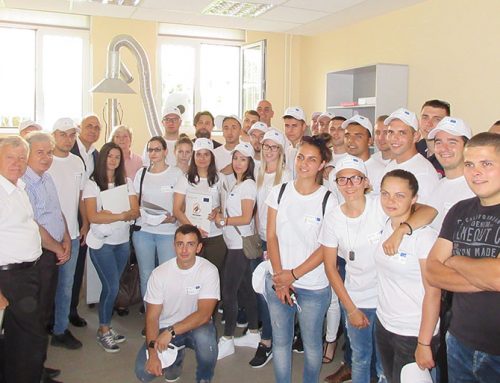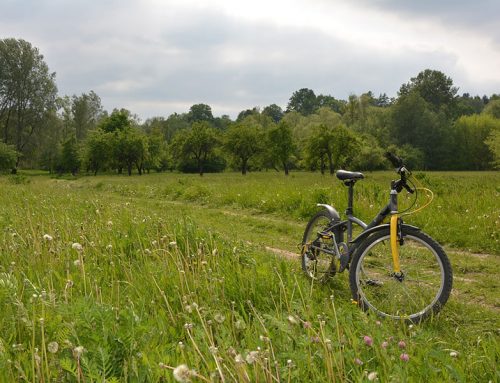Ten years ago, in early February 2005, Serbia was covered in deep snow. The usual one-hour ride from the small town of Ljig, 80 km away from Belgrade, turned into a three-hour journey. A group of experts set off on a tour to visit CSOs’ projects, funded by the EU under the Support to Civil Society in Serbia programme.
Project Manager Mirko Markovic and a young volunteer Vukosav Sredojevic, 16, nicknamed Vule, first grade Grammar School student, were at the Internet club in down town Ljig. Organising workshops designed to teach on how to use computers and access the Internet, the Club was an electronic resource training centre in this part of Serbia. Vule is tall and slender, shy in communication. Asked: Why are you here?, lowering his eyes he answered: To learn about the Internet… I want to make a web-site through which my father would sell his home-made brandy.
Vule has grown up in Babajic, a village 2 km away from Ljig, where his father has been making home-made plum brandy (shljivovitza) by a 100-year old family recipe invented by Vule’s grandfather Vukosav, whose name the brandy bears: “Vulovaca”. Father understood boy’s fascination with computers and technology, so he bought Vule his first computer when he was only seven years old.
“As soon as I got to know the world of Internet and web-design, I’ve decided to help out and repay my father. I was inspired by cheese and kaymak selling web-sites (that already existed in Ljig at the time) so my first project ever was www.vulovaca.com,” says Vule, now 26.
Back then, Vule’s web-site was the only one selling home-made brandy online in Serbia. Publication of Vule’s success story on the web-site of the former European Agency for Reconstruction triggered an avalanche on the Internet. In 2005 only, his web-site had 15.000 single visits from across the globe, while Vule was named the youngest web-designer in Serbia. Web-site reached people interested in the product all the way from the US, Canada, Australia, the Netherlands, Switzerland…
 In 2006, thanks to information on Vule’s web-site, delegation of Europe’s biggest fruit brandy producer, Czech’s Rudolf Jelinek, visited Ljig and learned more about the Sredojevics’ brandy-producing method. Given that a large number of Ljig’s residents are engaged in brandy production, Vule has helped many of them to set up their presentations and advertise on the Internet. In 2012, his cousin Mioljub Sredojevic won a Grand Gold Medal and Best Brandy title in Serbia within the contest held in Gornja Trepca. “It felt as if I have won the award… Because it meant that older people started to listen to me and respect my engagement with the Internet,” says Vule.
In 2006, thanks to information on Vule’s web-site, delegation of Europe’s biggest fruit brandy producer, Czech’s Rudolf Jelinek, visited Ljig and learned more about the Sredojevics’ brandy-producing method. Given that a large number of Ljig’s residents are engaged in brandy production, Vule has helped many of them to set up their presentations and advertise on the Internet. In 2012, his cousin Mioljub Sredojevic won a Grand Gold Medal and Best Brandy title in Serbia within the contest held in Gornja Trepca. “It felt as if I have won the award… Because it meant that older people started to listen to me and respect my engagement with the Internet,” says Vule.
Books and documents digitisation
Ljig is home to some 15.000 people and the only Grammar School in town, “1.300 kaplara”, was named in the memory of World War I and 1917 Battle of Kolubara that has been included in warfare textbooks in military academies around the world. As a Grammar School student, Vule dedicated himself to creation and maintenance of the Municipal web-site, www.ljig.rs. He was engaged in creation and maintenance of tourist locations’ web-sites in this part of Serbia, including Banja Vrujci, www.banjavrujci.org.rs. By promoting this resort, Vule was a part of the team which has built the first tourist “e-spot” in Serbia.
For Vule, going to college was a double challenge – getting used to a new environment in Belgrade as well as the need to study and work at the same time in order to make a living. He graduated from the Faculty of Informatics and Computing, Department for Programming and Projecting, in Belgrade, simultaneously creating and maintaining around 40 web-sites. “My jobs didn’t always involve the Internet… I was sometimes engaged in hard physical work, but I completed my studies within four years,” Vule recalls.
“I have never forgotten what the Internet Club did for me. I have always been there for them and took part in their projects,” Vule explains and adds: “Thanks to working with them, in 2011, I participated in Library of the City of Belgrade web-site design, www.bgb.rs. In cooperation with librarians, I became interested in books and documents cataloguing and database creation.”
Vule’s commitment and persistence were recognised by “Svetozar Markovic” University Library in Belgrade, where he found a job as a system administrator and web and software developer. As a part of the web team, Vule is responsible for the fact that, as of 1 January 2015, this Library has a modern and efficient content on its www.unilib.rs web-site.

During a year he has worked there, Vule has developed an e-book reader app for World War I collection, which he developed to commemorate a centenary of the Great War. His job at the Library includes participation in Europeana Newspaper project, a digitised collection of millions of books, archives, photos and documents. He has held several lectures on digitisation of archive material in Serbia and made a guest appearance at a conference in London. Apart from this, Vule is also a web editor of theInfoteka magazine, dedicated to digital humanities.
“I always enjoy going back to my beginnings and I want to help as much as I can. Within the project Knowledge for Everyone I hold free training courses on how to use the Internet. I realise it is time for me to pass my knowledge on to younger generations. The EU’s project helped me discover myself and reveal my future. It is time I proved to be worthy of the trust,” Vule said.
Ten years later, in early February 2015, there is no snow in Serbia. Winter is also mild in Ljig, where Vule’s journey has first begun.



